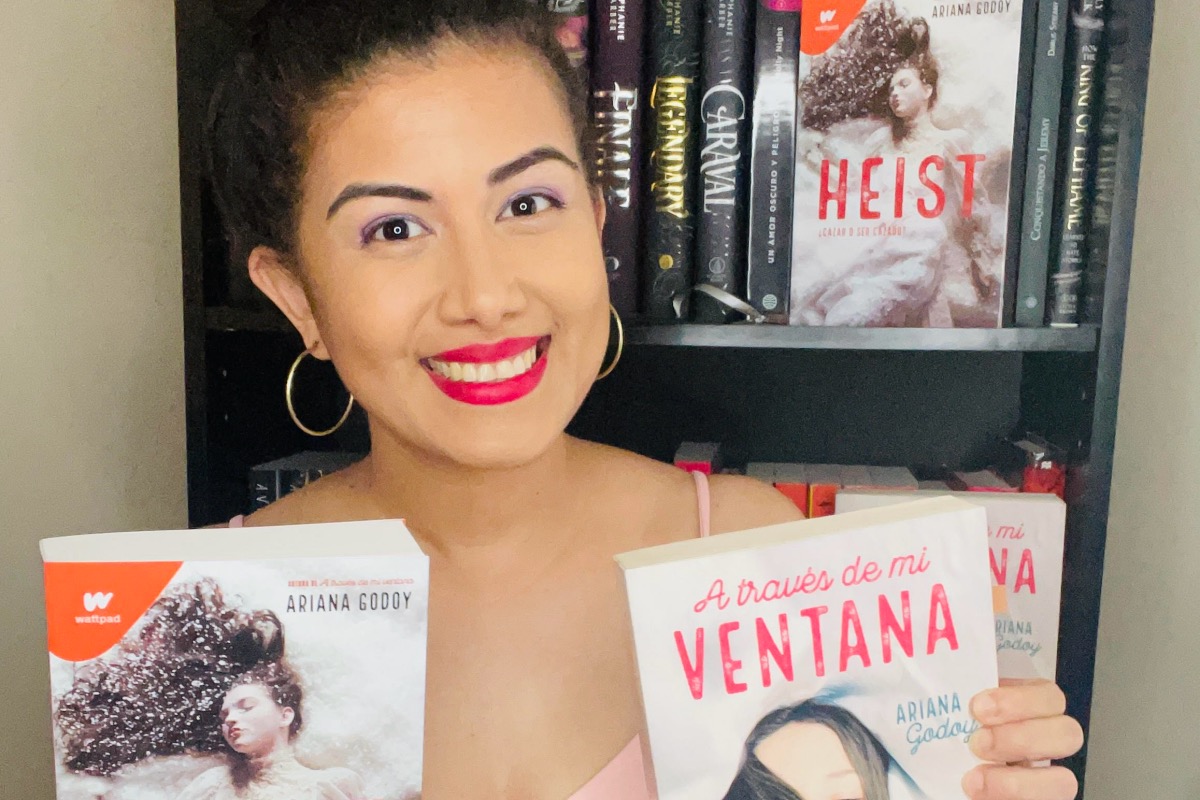

Author Ariana Godoy, whose romance novel ‘A través de mi ventana’ is now a hit Netflix film with two sequels already greenlit. (Courtesy of Ariana Godoy)
Latinx people are out here doing it for ourselves. Little representation in Hollywood? We’ll make our own stuff. Publishing largely ignores our inquiries? We’ll find another way.
That’s what author Venezualan Ariana Godoy did and she’s reaping the benefits with her novel A tráves de mi ventana, now also a hit film on Netflix.
If you just read U.S.-based news, you may have missed the edgy teen romance, although that’s not for lack of popularity. A tráves de mi ventana did remarkably well on the streamer—we’re talking breaking into the top 10 charts in nearly 90 countries, including the U.S., and staying there for a month in many places across Europe and Latin America.
I can’t help but think the reason why it didn’t earn many headlines has a lot to do with its originating in the brain of a Latina. A tráves de mi ventana is in Spanish, tells the story of young people falling in love, and doesn’t come with traditional publishing’s stamp of approval—not exactly critical catnip.
The author of multiple books, Godoy started out on Wattpad, an online community where people share their stories and book chapters in real time, garnering audience feedback as they go. Godoy joined the platform back in 2009, telling Latino Rebels that she began as a reader. When she realized regular people, not just established authors, were sharing their work, she uploaded a vampire story she’d written—this was in the Twilight era. The story went viral, and Wattpad has been her home ever since.
Writing on Wattpad is very different than traditional publishing, “because it’s not lonely,” she says. “(In traditional publishing,) nobody’s there to cheer me on to finish this chapter… And the feedback is just amazing. You can tell what is working and what’s not working.”
She’s also happy to experience a different power dynamic where she doesn’t have to beg publishers to be heard. Instead, she connected directly with her audience, without asking anyone’s permission and proving her work resonates.
For Godoy, that’s meant multiple publishers sliding into her DMs with book deals. It’s also led to the Netflix film, now with two sequels greenlit.


Clara Galle as Raquel in Netflix’s ‘Through My Window/A través de mi ventana’ (Netflix/Nostromo Pictures)
Godoy tries to use her platform for good but not shy away from the thorny truth of teen romance. In the film, we see Ares get explicit consent from Raquel before sex, a rarity on film. This simple act provides young viewers with a model for what getting consent can look like, making it a normalized part of foreplay.
Godoy was also purposeful to include a condom, something she said she forgot to mention in the first writing. After re-reading those scenes, she said to herself: “Oh, my gosh, where is the wrapper?” She’s since included condoms in her love scenes—even those with oral sex. Her teenage readers on Wattpad were surprised, but Godoy is happy to educate them, taking her “responsibility” as “the older” generation seriously.
Now, I’m not going to tell you that Raquel and Ares have the perfect relationship —there wouldn’t be a movie if there weren’t conflict— or that A tráves de mi ventana is perfect. Some even say it glorifies stalking: it opens when neighbors Raquel and Ares meet, having lived next to each other for years, but Raquel’s been watching him, looking him up online, and physically following him around. Several characters correctly name this behavior as “stalking,” although we don’t actually see Raquel doing it—the stalking mostly occurs before the book starts.
Raquel and Eres end up together, forming the central romance of the series, in a move that potentially encourages stalkers everywhere. But Godoy disagrees, saying: “I never felt like I was glorifying anything, because [Raquel] tells you this is wrong … There’s not a moment where she says, ‘Oh, it’s okay, because I like him.’ She’s like, ‘Oh, my gosh, I shouldn’t be doing this. I’m crazy. I need [help.]’ She’s obviously very self-aware.”
For Godoy, that self-awareness is the difference between glorifying and depicting unhealthy behaviors.
She’s also quick to point out the double standard, saying that thrillers don’t get called out for glorifying violence. Instead, it’s “always romance… romance being read by females” that gets that critique. Certainly, the perceived femininity of the genre allows it to be easily misrepresented by critics. But Godoy isn’t letting that stop her or change her course. She’s writing more and has big dreams for herself, even beyond her current three-film deal with Netflix.
In particular, she’s happy to connect with her young readers who tell her things like “I didn’t know my favorite working writer looked like me.” Her advice to them? “Just keep going keep writing. The system is changing. … I’m cheering for you.”
***
A writer and activist, Cristina Escobar is the co-founder of latinamedia.co, uplifting Latina and gender non-conforming Latinx perspectives in media. She’s a member of the Latino Entertainment Journalists Association and writes at the intersection of race, gender, and pop culture. Twitter: @cescobarandrade


